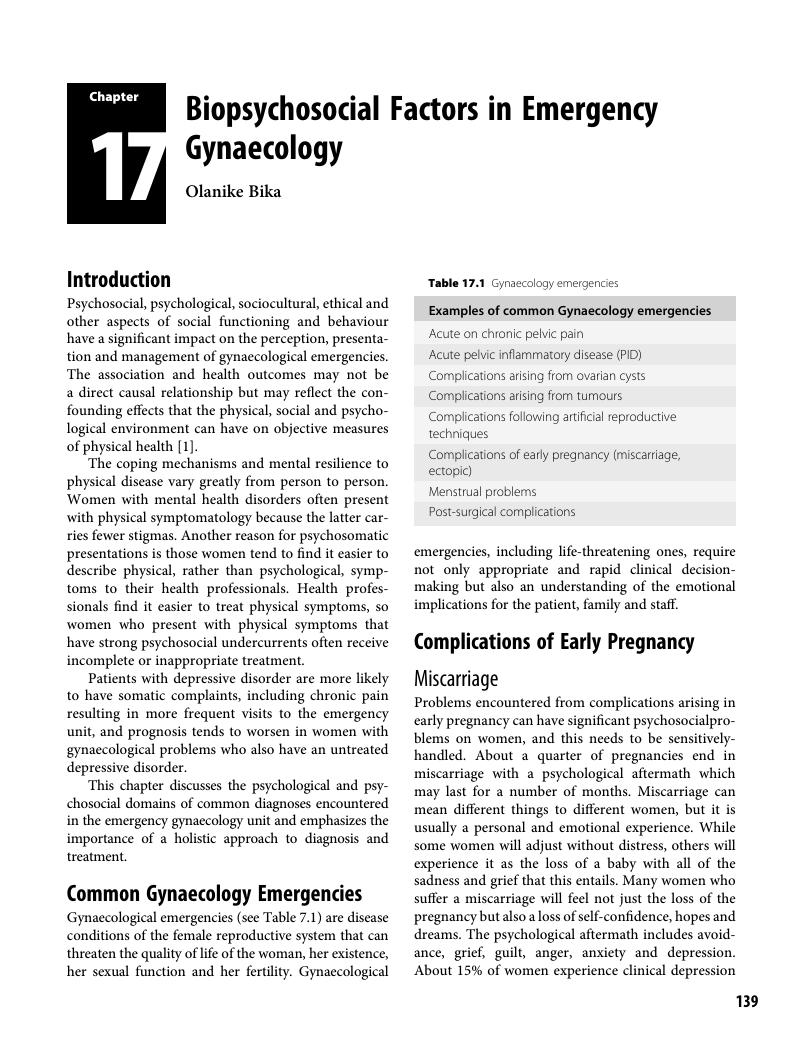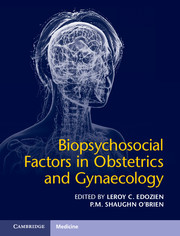Book contents
- Biopsychosocial Factors in Obstetrics and Gynaecology
- Biopsychosocial Factors in Obstetrics and Gynaecology
- Copyright page
- Dedication
- Contents
- Contributors
- Preface
- Section 1 Generic Issues
- Section 2 Gynaecology
- Chapter 10 Diverse Sex Development
- Chapter 11 Biopsychosocial Factors in Paediatric and Adolescent Gynaecology
- Chapter 12 Biopsychosocial Factors in Premenstrual Syndrome
- Chapter 13 Biopsychosocial Factors in Abnormal Uterine Bleeding
- Chapter 14 Biopsychosocial Aspects of Infertility
- Chapter 15 Psychological and Social Aspects of Reproductive Life Events among Men
- Chapter 16 Biopsychosocial Factors in Chronic Pelvic Pain
- Chapter 17 Biopsychosocial Factors in Emergency Gynaecology
- Chapter 18 Biopsychosocial Factors in Urinary Incontinence
- Chapter 19 Biopsychosocial Perspectives on the Menopause
- Chapter 20 Biopsychosocial Factors in Gynaecological Cancer
- Chapter 21 Assessment and Management of Women with Nausea and Vomiting during Pregnancy
- Section 3 Sexual and Reproductive Health
- Section 4 Obstetrics and Maternal Health
- Appendix: RCOG Checklist of Hints and Tips to Support Clinical Practice in the Management of Gender-Based Violence
- Index
- References
Chapter 17 - Biopsychosocial Factors in Emergency Gynaecology
from Section 2 - Gynaecology
Published online by Cambridge University Press: 30 August 2017
- Biopsychosocial Factors in Obstetrics and Gynaecology
- Biopsychosocial Factors in Obstetrics and Gynaecology
- Copyright page
- Dedication
- Contents
- Contributors
- Preface
- Section 1 Generic Issues
- Section 2 Gynaecology
- Chapter 10 Diverse Sex Development
- Chapter 11 Biopsychosocial Factors in Paediatric and Adolescent Gynaecology
- Chapter 12 Biopsychosocial Factors in Premenstrual Syndrome
- Chapter 13 Biopsychosocial Factors in Abnormal Uterine Bleeding
- Chapter 14 Biopsychosocial Aspects of Infertility
- Chapter 15 Psychological and Social Aspects of Reproductive Life Events among Men
- Chapter 16 Biopsychosocial Factors in Chronic Pelvic Pain
- Chapter 17 Biopsychosocial Factors in Emergency Gynaecology
- Chapter 18 Biopsychosocial Factors in Urinary Incontinence
- Chapter 19 Biopsychosocial Perspectives on the Menopause
- Chapter 20 Biopsychosocial Factors in Gynaecological Cancer
- Chapter 21 Assessment and Management of Women with Nausea and Vomiting during Pregnancy
- Section 3 Sexual and Reproductive Health
- Section 4 Obstetrics and Maternal Health
- Appendix: RCOG Checklist of Hints and Tips to Support Clinical Practice in the Management of Gender-Based Violence
- Index
- References
Summary

- Type
- Chapter
- Information
- Biopsychosocial Factors in Obstetrics and Gynaecology , pp. 139 - 145Publisher: Cambridge University PressPrint publication year: 2017



